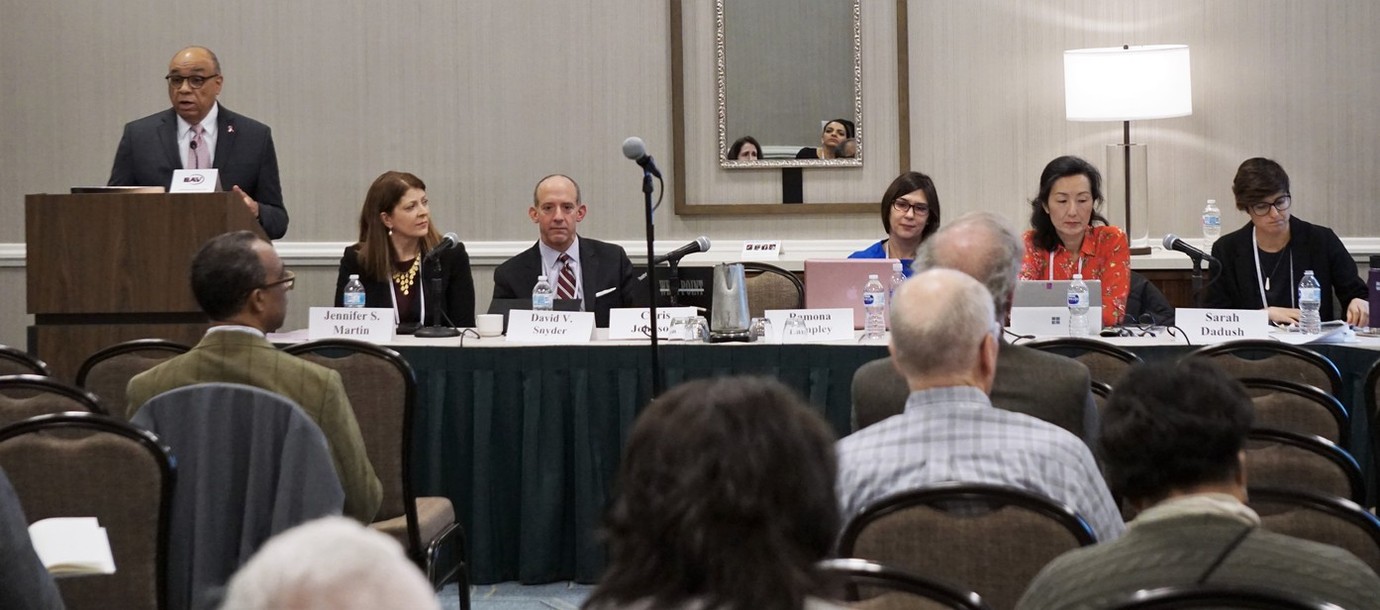AALS sections provide opportunities for law school faculty and staff to connect on issues of shared interest. Each section is focused on a different academic discipline, affinity group, or administrative area. For a full list of sections and information on how to join, please visit the AALS Sections webpage.
The AALS Section on Contracts promotes the communication of ideas, interests, and activities among members and makes recommendations to the association on matters of interest in the teaching and improvement of the law relating to contracts.
Chair: Sidney W. DeLong, Seattle University School of Law
Chair-Elect: Richard Brooks, New York University School of Law


Sidney DeLong: Most of our members are professors who teach and conduct scholarship in the area of contracts. Many have written casebooks — I think there are more contracts casebooks than in any other law school course. Many are active on legislative initiatives that concern contract issues in consumer and business law.
Richard Brooks: I think they come to the section for two reasons. One is the community: the contracts listserv is one of the most robust forums online. The second is to learn what is new in the field of contract law. There are not as many new issues compared to, for example, intellectual property law, where novel claims seem to arise daily. Contract law is more stable. Our community appeals to the basic, fundamental principles of law.
SD: The section membership is an unusually tight community of scholars and professors. The listserv circulates ideas much faster than publications and raises questions of every sort at every level of abstraction. I also agree that contract law involves perennial questions and it is rare that a dramatic new case will demand a quick institutional response.
RB: Many people may end up teaching corporations and business organizations. We also have crossover with drafting, negotiation, secure transactions, and, increasingly, arbitration. In arbitration, there has been a fundamental impact on contract doctrine. The Supreme Court’s recent rulings on arbitration have influenced various state contract law principles, such as assent, contractual interpretation and unconscionability. Those are just some of the affiliated domains that many of us engage in.
A constant theme on our listserv is the limitation of only having one semester and four units for teaching contracts. There’s a lot of envy when we hear about colleagues who get five units or two semesters of required basic contracts courses. We recently discussed how to add more contracts into the first-year curriculum in other courses.
SD: The shrinking of the contracts course is almost universally lamented by contracts professors. We have all been forced to cut something — in Article 2 or certain doctrines. The problem of coverage is aggravated because, as a first-year course, much of Contracts has nothing to do with doctrine but concerns more general topics such as how to read a case, understanding what lawyers do, etc. My sense is that many contracts professors have had to adapt to this credit shrinkage by cutting out material that is not tested on the bar. There is an absolute minimum amount of doctrine that we must cover, and I think it’s a false economy to think, “Well, I can do that in one semester rather than two.”
The domain of contracts is largely an artifact of history. For example, a first-year contracts course is where students learn about remedies for the first time, rather than in a torts or properties course. One of the dramatic examples of that is, as Rick says, the effect of mandatory arbitration. Many schools do not have a course in domestic arbitration, so it may fall to Contracts by default.
Remedies is another very common pairing for contracts. A genre of contracts casebooks begins with remedies before addressing substantive law. Even in other casebooks, the attention to remedies may surprise people who teach other subects. The course in Contracts demonstrates that common law rights are defined by their associated remedies.
One way to address the shrinkage in credits is for first year courses to share the load of teaching concepts common to them all. For example, I coordinate with the Torts professor because there is so much crossover. We each frequently refer to what students are learning in the other course for comparison and contrast. And, while Contracts takes the lead in teaching remedies, Torts does so in teaching causation, even though both topics are essential to both courses.
SD: Teaching panels always draw people in, and I think the same was true of the session on teaching methods. The program on supply chains had a very interesting panel, all but one of whom had worked on a legislative drafting project that is trying to provide ways in which purchasing firms can ensure human rights in international supply chains in which their sources are remote. The panel concerned using contract methods to ensure that no violations of human rights have occurred in relation to the creation or selling of goods. One participant on the panel was skeptical of some of the others’ conclusions, so the discussion was very lively.
Next year, we’ll be doing non-disclosure agreements with the Section on Alternative Dispute Resolution. Sub-topics might include: the enforcement of non-disclosure agreements; remedies for their breach; public policy and non-disclosure agreements; the legality and constitutionality of requiring public officials to agree to a non-disclosure agreement that goes beyond their statutory obligations, cost and benefits of nondisclosure agreements and mandatory arbitration; professional ethics issues presented by non-disclosure agreements; and the relationship between nondisclosure agreements and intellectual property. I don’t think we’re going to have too much trouble finding someone with an opinion about one of those things.
SD: We have an extremely simple structure: a chair, vice chair, secretary, and treasurer. Usually the chair will serve for one more meeting after serving as chair. The section adds a new member every year and drops a member every year, and so committee members systematically work their way up to the chair position. We have no standing sub-committees; it’s simply a committee of the whole.
I don’t believe the purpose of this section is to provide leadership for its membership. Rather, I see its purpose as being here to help them to pursue their own scholarly and pedagogical missions. There has been no expressed need for a higher degree of organization, direction, and initiatives. Right now, the section achieves that goal quite well by providing a platform for free and spontaneous communication about questions its members have relating to contracts and contract law. If we had a different sense of purpose and direction, then it might require a different organization and mission statement.
 Section on Contracts session at the 2019 AALS Annual Meeting.
Section on Contracts session at the 2019 AALS Annual Meeting.
SD: By far the most vigorous conversation in recent years arose around the draft of the Restatement of the Law, Consumer Contracts which was proposed at this summer’s ALI meeting. The draft prompted scholarship and advocacy on many perennial contracts topics, including the prevailing law relating to formation of rolling contracts; blanket assent to standardized contract terms; the doctrine of unconscionability; and even the appropriate role for restatements of the law. The listserv was the major conduit for this exchange. Many members of the section contributed criticism of the draft both before and at the ALI meeting.
For several prior years, mandatory arbitration under the Federal Arbitration Act was the hottest topic in contract law. Another long-standing topic involved rolling contract formation: the parties seem to come to an agreement, then the buyer pays for and receives the goods and only then is shown the terms of the agreement. The buyer is deemed to accept these terms by not returning them. Rolling contracts upset traditional contract ideas about offer and acceptance. Blockchain contracts and automated contracting have been topics of scholarship, as well as contracts in the “gig economy.”
A lot of this discussion works its way into casebooks. That may be one of the reasons why a seemingly unusual number of contracts professors have published contracts casebooks: because everybody has a different idea about how to convey this material.
One thing that makes contracts the best first-year course is that it introduces the students to private ordering, in which people can remake their legal relationships by agreement. While that’s an extraordinary amount of freedom, it is also extremely dangerous. If one party is much more powerful than the other, then that power will be accentuated because it is backed up by the law. It’s an exciting course to teach.
SD: I will be happy to keep doing what we’re doing. For whatever reason, the contracts section has a strong sense of community. New professors on the listserv have no hesitancy in asking for advice and it is generously given. The contracts professorship is an extremely egalitarian one. You’ll find the author of major treatises giving assistance to someone who’s just getting started. They are very generous with time and advice. I hope the flow of information, mentorship, and ideas continues unabated.